- Home
- Tiffany Reisz
The Lucky Ones Page 3
The Lucky Ones Read online
Page 3
Capello on that envelope and you turn white as a ghost. You take a book off the shelf and hold it so tight for some reason your hands shake.” He took the book from her hands. “Except you...” He flipped through the book and found a page marked by a photograph, which he pulled out. “Except you keep a picture of your old family pressed in the pages of that book.”
Allison swallowed. “Except all that,” she said.
McQueen was staring at the photograph he’d taken out of her book. Allison didn’t look at it. She didn’t have to. She saw it in her mind’s eye. There were three kids in the picture—all three in red hoodies. One boy with dark blond hair that fell past his ears, one girl with hair so red it was almost orange and one boy with black hair straight as an arrow. They all held sparklers in their hands and in the background of the photo was the ocean, vast and gray.
“Roland?” McQueen asked, pointing to the one with black hair.
“That’s Deacon. Roland’s the dirty blond,” Allison said. “The girl’s Thora. Dr. Capello gave us those red sweatshirts. He said it made it easier for him to find us on the beach when there were big crowds.”
“Sweatshirts on the beach?”
“It was Oregon,” she said.
“And where are you in this picture?” McQueen asked.
Allison pointed to the left side of the photograph that had been torn away.
“There,” she said. “I don’t know who has the other section. I found this in my suitcase when I unpacked at my aunt’s.”
“So there were four of you?”
“No, there were others,” she said. “But they were fosters, like me. There was an older girl named Kendra. And a boy about my age or a little older named Oliver. A few others but they didn’t stay long. Roland, Thora and Deacon were the three kids Dr. Capello adopted.”
“Did he want to adopt you?”
“I think so,” Allison said. “But he didn’t.”
Allison took the photograph out of McQueen’s hand, slipped it back in the pages of the book, walked over and put the book back on the shelf.
“There, I told you everything. Now you can go.”
“Not until you open the package.”
“Why do you care?”
“What if this Roland guy is writing to confess to the crime?”
“Roland was sixteen by then, almost seventeen. He had a summer job in another town. He wouldn’t have been home at the time. Trust me, I thought about this a lot after I left them.”
“So you aren’t over it.”
“I was twelve living with an elderly woman in a retirement community. Not like I had much else to do.”
“Then maybe Roland knows something and is finally coming clean.” McQueen stood up and followed her to the kitchen.
“Maybe he is,” Allison said.
“Open it.”
“I will.” Allison turned to face him. “Soon as you’re gone.”
“Cricket...” He put his hands on her hips.
Allison touched his face, his five-o’clock shadow that always came in about an hour early every day.
“Goodbye, McQueen,” she said, taking his hands by the wrists and removing them from her body.
His shoulders slumped in defeat before he straightened up again and picked up his keys off the table and shoved them in his pocket.
“All right,” he said. “You win. But do me a favor, okay?” He went to the door. “Keep in touch.”
Allison opened the door for him and he started to walk out. Then stopped. Then turned back. She knew it was coming and she knew she could stop it. She didn’t.
He took her face in his hands and kissed her lips, a long lingering kiss, a kiss she returned. The kiss was a bad idea, a terrible idea, but at least it gave her the chance to pull away first.
“I always knew I’d regret getting involved with you,” Allison said.
“Then why did you do it?” he asked.
“Because I knew I’d regret not getting involved with you even more.”
He laughed and that was a shame because McQueen had a good laugh. Too good. He kissed her again.
“One more time,” he said against her lips. “Maybe that’ll make you feel better.”
Allison let him take her into the bedroom.
She didn’t want it, but she needed it.
Anything was better than being alone.
Chapter 3
Last times were no time for anything fancy. McQueen stripped her naked, put her on her back in the bed and kissed every inch of her like he was kissing every inch goodbye. Allison sighed with pleasure when he entered her. It was either sigh or cry and she refused to give in to her tears again. McQueen kissed her neck and said into her ear, “And to think I always thought I was the first rich son of a bitch to take you in from the cold.”
“Oh, you were,” she said, almost smiling. “Dr. Capello wasn’t a son of a bitch.”
Dr. Capello was, in fact, an angel. At least, that’s how she’d once thought of him. Until age seven, Allison had lived in a little town called Red, where even the trees in spring were a dull shade of brown. High desert, they called it, past the Cascades, which might as well have been a sky-high wall for how well they trapped the rain on the other side of the mountains. Although Allison’s teachers had said they lived an hour’s drive away from mossy green forests and three hours from the ocean, she had never believed them. The whole world was high desert to her until that day the man with the brown beard came to the house where they’d taken her because she had nowhere else to go.
Allison lived in the single-story house with siding the color of desert sand, and shared a room with three other girls, all of them older. Older and terrifying. All three of them resented the intrusion of a “little girl” into their tween kingdom. It was 1997 and she had no idea who those boys were in the posters on the wall and not knowing who the Backstreet Boys were was apparently enough of a crime to render Allison unworthy of friendship or even basic kindnesses from anyone but Miss Whitney.
She’d gone to find Miss Whitney that day, because one of the girls—Melissa, the biggest one who called all the shots—had slapped Allison for daring to sit in the wrong chair. Allison had taken her tearstained red face to Miss Whitney’s tiny office in the hopes of being allowed to hide there and read all day. Miss Whitney had let her do that a time or two. Apparently Allison was “adjusting poorly” and suffering from “profound stress,” and she needed a “more nurturing environment.” Allison wasn’t sure what all that meant, but she’d heard Miss Whitney saying that on the phone to someone the day before. What Allison really wanted was her mother back, but Miss Whitney had reminded her—kindly and more than once—that her mother was never coming back. They’d been trying to find her long-gone father instead, or another relative for her to live with. No luck yet, except an aunt deemed too old to handle a seven-year-old girl.
The first time she’d seen the man with the beard he’d been hugging Miss Whitney in her office. Allison stood in the doorway and stared at the man who was tall and dressed in what looked to her like blue pajamas. He patted Miss Whitney’s back very hard as he hugged her, which made Miss Whitney laugh and wince, wince and laugh.
“My God,” the bearded man said as he pulled back from the hug. He’d seen her lurking in the doorway. “Is this her?” He turned to Miss Whitney, his brown eyes wide.
“That’s her. That’s our Allison.”
Immediately, he squatted on the floor to meet Allison eye to eye.
Allison took a step back, afraid she’d broken a rule.
“It’s all right,” the man said, and his beard split apart in a big smile that showed a row of bright white teeth. “Don’t be scared.”
“I’m not scared,” Allison said. “Are you?”
He grinned at that. “Surprised. You look a little like another girl I used to know.”
“I thought the same thing when I saw her,” Miss Whitney said. “Cousins at least. Should I not have called?”
“
No, no...” the bearded man said. “It’s fine.”
“Why are you wearing pajamas?” Allison asked the bearded man. She knew they were pajamas because the pants had a drawstring on them like her pajamas. Zipper meant outdoor pants. No zipper meant indoor pants. That’s how her mother had explained it.
The bearded man laughed and it was a nice laugh and he had nice eyes. Nice, not like pretty, but nice like kind.
“These are called scrubs,” he said. “They’re not pajamas. Doctors wear them.”
“Are you a doctor?” Allison asked.
“I am.”
“Is somebody sick?”
“You tell me,” the bearded man said. “You don’t look too good.”
“I got hit.”
“Hit?” the bearded man said, and looked up at Miss Whitney.
“Melissa?” Miss Whitney asked.
Tears welled up in Allison’s eyes again and she nodded.
“I’ll be back,” Miss Whitney said with a put-upon groan.
“You go jerk a knot in Melissa’s tail,” the bearded man said. “I’ll get Allison here back in working order.”
He stood up straight and Miss Whitney patted him on the arm as she left the office. They were alone together now, Allison and the bearded man.
“Does it hurt?” he asked, his hand on his chin.
“A little.”
“It’s okay if you cry,” he said. “I can tell you want to.”
“Katie said I shouldn’t cry.”
“Why not?”
“They don’t want you if you cry too much.”
“They?”
“People who take kids home with them,” she said.
The bearded man cupped his hand by his mouth and whispered, “I don’t mind if you cry. No skin off my rosy nose.”
That made her feel better, so much better she didn’t want to cry anymore.
“Let’s go find a bathroom,” he said.
Allison showed him where it was. He put her on the counter, wetted a washcloth and pressed it to her cheek.
“How’s that now?” he asked. “Better?”
“Lots.”
“Fantastic,” he said. “Another patient cured. That’ll cost you two bits.”
“What’s a bit?”
“I have no idea,” the bearded man said. “Used to hear it on TV all the time—shave and a haircut, two bits. Never did figure out how much two bits was.”
Allison looked around, saw a tissue box and ripped two pieces off one tissue.
“Here,” she said, holding them up in front of his face. “Two bits.”
“Are you sure?”
“You said you didn’t know what they are,” Allison said. “So how do you know those aren’t bits?”
The bearded man looked at the two tissues in his hand, stuck his lips out and nodded.
“You’re a very smart little girl,” he said. “I accept your payment. And I give you a clean bill of health. Now tell me, what’s going on with you and this Melissa?”
“I sat in her chair. She didn’t like that.”
“And she hit you?”
Allison said nothing.
“You know,” the man said, “sometimes kids learn to hit from their parents. Their parents hit them and then they don’t know any better.”
“I know not to hit,” Allison said.
“That’s because you’re so smart,” he whispered again. A whisper, then a wink. She didn’t know why he was whispering. Everyone in the house was a shouter. Melissa shouted and the other two girls shouted and Miss Whitney shouted at them all to stop shouting. Allison didn’t shout. She cried. She hid. She slept. But she never shouted.
“How’s the patient?”
Allison turned to see Miss Whitney coming into the bathroom.
“She’s on track to make a full recovery,” the bearded man said. “If we can keep her out of the path of slappers.”
“That’s not going to happen in this house,” Miss Whitney said with a sigh.
“No word on the father?” he asked.
“No father on the birth certificate. Sole living relative is a great-aunt who would take her if nobody else turns up. But she’s seventy, lives in Indiana, and she’s been sick.”
The bearded man harrumphed. Allison hadn’t ever met her great-aunt, a lady named Frankie who lived really far away, though she’d seen Christmas cards from her.
“I gotta figure something out here,” Miss Whitney said. “Allison weighed forty-seven pounds when she got here. Yesterday she weighed forty-two. One month.”
The bearded man harrumphed and whistled this time.
“Let me talk to her,” he said.
“You are talking to me,” Allison said.
“She’s very bright,” the bearded man said to Miss Whitney.
“Told you so. Reads on a fifth-grade level. Eats like a toddler.” Miss Whitney patted Allison on her knee. “Sweetheart, this is a good friend of mine. Vincent Capello. He’s a brain surgeon. We used to work together at a hospital in Portland. He was nice enough to come all the way out here to check on you. Brain surgeons usually don’t make house calls, so you should feel very special.”
“She is very special,” the man said. Allison grinned, happy to have someone being nice to her for the first time that day. She was still sitting on the bathroom counter. She wasn’t tall enough to be able to jump down without help yet and the bearded man, the doctor, had left her up there.
Miss Whitney left her alone again with the man who didn’t do anything at first but tug his beard hairs.
“Do you like it here, Allison?” he asked.
Allison’s mother had taught her not to complain, ever. Not so much out of politeness but because it never helped anything.
“I like Miss Whitney,” Allison said.
“She is a very nice lady.” The man nodded in agreement. “Do you like the girls here?”
Allison didn’t answer.
“Allison? Do you like the other girls here?”
“I’m not supposed to say.”
“Why not?” The bearded man furrowed his brow.
“If you can’t say something nice, you shouldn’t say anything at all.”
He laughed.
“I guess I have my answer. You have quite the moral compass, young lady,” he said. “Adults could learn from you.”
She smiled broadly. She didn’t know what a moral compass was, but she knew a compliment when she heard it.
“Miss Whitney says you aren’t eating. Want to tell me why?” he asked.
Allison had dropped her chin to her chest. “Not hungry.”
“Does your stomach hurt?” he asked.
She shook her head.
“No?” he said. Allison stopped talking and hoped he would, too.

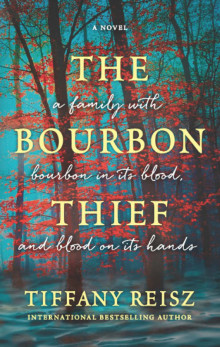 The Bourbon Thief
The Bourbon Thief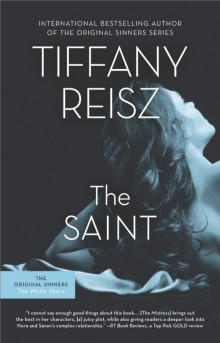 The Saint
The Saint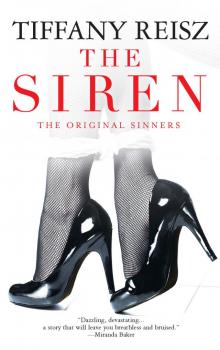 The Siren
The Siren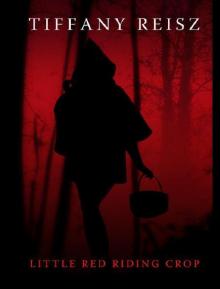 Little Red Riding Crop
Little Red Riding Crop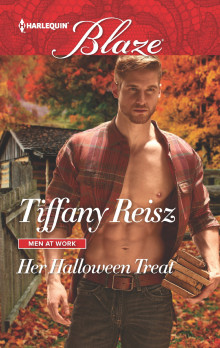 Her Halloween Treat
Her Halloween Treat The Mistress
The Mistress The Last Good Knight
The Last Good Knight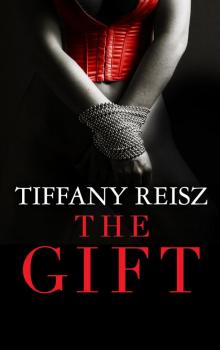 The Gift (Seven Day Loan)
The Gift (Seven Day Loan)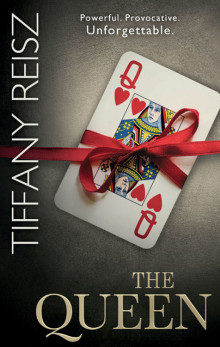 The Queen
The Queen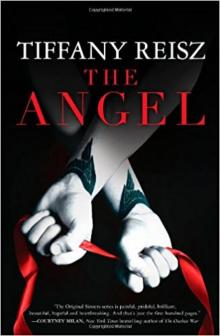 The Angel
The Angel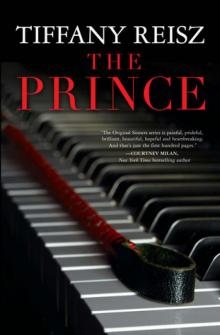 The Prince
The Prince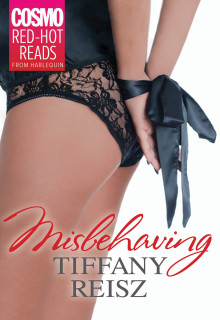 Misbehaving
Misbehaving The Red
The Red Submit to Desire
Submit to Desire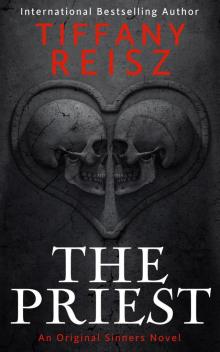 The Priest: An Original Sinners Novel
The Priest: An Original Sinners Novel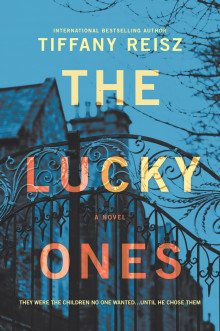 The Lucky Ones
The Lucky Ones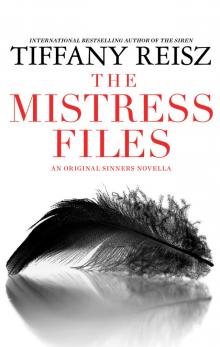 The Mistress Files
The Mistress Files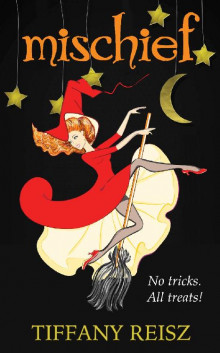 Mischief
Mischief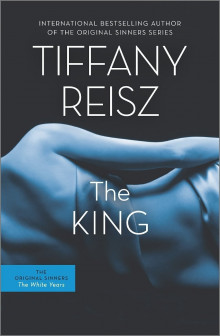 The King
The King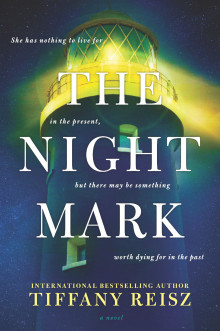 The Night Mark
The Night Mark The Virgin
The Virgin Her Naughty Holiday
Her Naughty Holiday One Hot December
One Hot December The Auction (The Original Sinners Pulp Library)
The Auction (The Original Sinners Pulp Library) A Winter Symphony: A Christmas Novella
A Winter Symphony: A Christmas Novella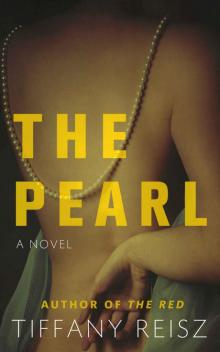 The Pearl (The Godwicks)
The Pearl (The Godwicks) Immersed In Pleasure/Submit To Desire (The Original Sinners Pulp Library)
Immersed In Pleasure/Submit To Desire (The Original Sinners Pulp Library)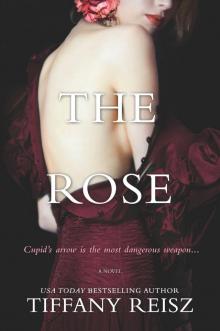 The Rose
The Rose Winter Tales: An Original Sinners Christmas Anthology
Winter Tales: An Original Sinners Christmas Anthology Winter Tales
Winter Tales The Last Good Knight (The Original Sinners Pulp Library)
The Last Good Knight (The Original Sinners Pulp Library) The Return (The Original Sinners)
The Return (The Original Sinners)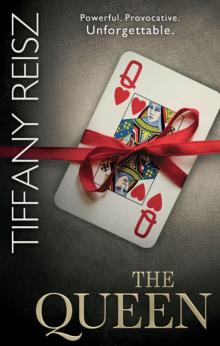 0778318435 (A)
0778318435 (A) Seven Day Loan
Seven Day Loan Picture Perfect Cowboy
Picture Perfect Cowboy The Christmas Truce
The Christmas Truce 10 Shades of Seduction
10 Shades of Seduction The Chateau_An Erotic Thriller
The Chateau_An Erotic Thriller The Christmas Truce: An Original Sinners Novella
The Christmas Truce: An Original Sinners Novella Immersed in Pleasure
Immersed in Pleasure Harlequin E Shivers Box Set Volume 4: The HeadmasterDarkness UnchainedForget Me NotQueen of Stone
Harlequin E Shivers Box Set Volume 4: The HeadmasterDarkness UnchainedForget Me NotQueen of Stone Something Nice: An Original Sinners Novella
Something Nice: An Original Sinners Novella The Confessions
The Confessions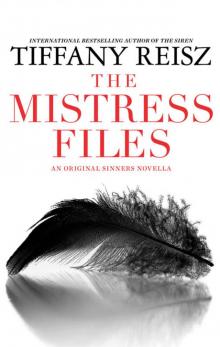 The Mistress Files: The Case of the Acting ActressThe Case of the Diffident DomThe Case of the Reluctant Rock StarThe Case of the Secret SwitchThe Case of the Brokenhearted Bartender
The Mistress Files: The Case of the Acting ActressThe Case of the Diffident DomThe Case of the Reluctant Rock StarThe Case of the Secret SwitchThe Case of the Brokenhearted Bartender One Hot December (Mills & Boon Blaze) (Men at Work, Book 3)
One Hot December (Mills & Boon Blaze) (Men at Work, Book 3) The Scent of Winter: A Novella
The Scent of Winter: A Novella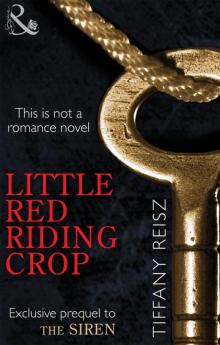 Little Red Riding Crop (Spice) (Prequel to The Siren: Book 1 in The Original Sinners series)
Little Red Riding Crop (Spice) (Prequel to The Siren: Book 1 in The Original Sinners series)